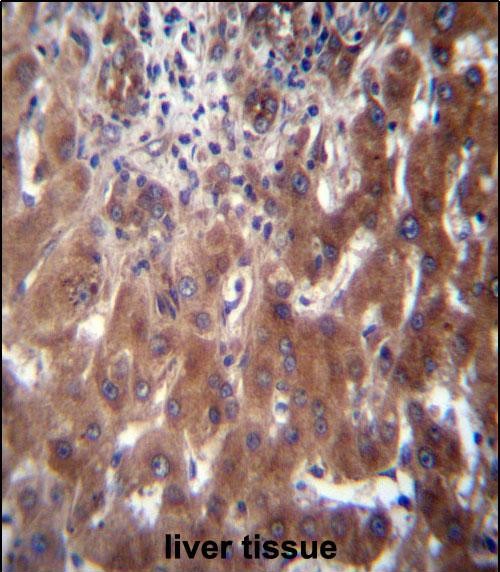

| WB | 1/1000 | Human,Mouse,Rat |
| IF | 咨询技术 | Human,Mouse,Rat |
| IHC | 1/100-1/500 | Human,Mouse,Rat |
| ICC | 技术咨询 | Human,Mouse,Rat |
| FCM | 咨询技术 | Human,Mouse,Rat |
| Elisa | 咨询技术 | Human,Mouse,Rat |
| Aliases | Sodium channel and clathrin linker 1, Sodium channel-associated protein 1, SCLT1, SAP1 |
| Entrez GeneID | 132320 |
| WB Predicted band size | 80.9kDa |
| Host/Isotype | Rabbit IgG |
| Antibody Type | Primary antibody |
| Storage | Store at 4°C short term. Aliquot and store at -20°C long term. Avoid freeze/thaw cycles. |
| Species Reactivity | Human |
| Immunogen | This SCLT1 antibody is generated from rabbits immunized with a KLH conjugated synthetic peptide between 577-605 amino acids from the C-terminal region of human SCLT1. |
| Formulation | Purified antibody in PBS with 0.05% sodium azide. |
+ +
以下是关于SLC1A5(ASCT2)抗体的3篇参考文献,涵盖其在癌症、代谢及抗体开发中的应用:
---
1. **文献名称**:*Targeting ASCT2-mediated glutamine uptake blocks prostate cancer growth and tumour dependence on the microenvironment*
**作者**:van Geldermalsen, M. et al.
**摘要**:该研究通过开发针对ASCT2(SLC1A5)的单克隆抗体,证明抑制谷氨酰胺转运可显著抑制前列腺癌细胞增殖,并破坏肿瘤微环境代谢依赖,为靶向ASCT2的癌症治疗提供依据。
---
2. **文献名称**:*Monoclonal antibody against SLC1A5/ASCT2 induces apoptosis and synergizes with mTOR inhibitors in lung cancer*
**作者**:Hassanein, M. et al.
**摘要**:研究团队开发了一种靶向SLC1A5的人源化抗体,发现其可诱导肺癌细胞凋亡,并与mTOR抑制剂联用增强抗肿瘤效果,提示其在联合疗法中的潜力。
---
3. **文献名称**:*ASCT2 antibody-drug conjugate selectively targets glutamine-addicted triple-negative breast cancer*
**作者**:Li, X. et al.
**摘要**:该文献报道了一种ASCT2抗体-药物偶联物(ADC),通过靶向三阴性乳腺癌中高表达的ASCT2.特异性递送细胞毒素,显著抑制肿瘤生长并减少系统性毒性。
---
如需具体文献DOI或扩展内容,可进一步提供研究方向或时间范围。
The sodium-glucose cotransporter 1 (SGLT1), encoded by the *SLC5A1* gene, is a membrane protein primarily responsible for glucose and galactose absorption in the intestinal epithelium. It couples the transport of sodium ions with glucose against a concentration gradient, utilizing the sodium electrochemical gradient maintained by Na+/K+-ATPase. SGLT1 is crucial for dietary glucose uptake and is also expressed in the kidney, heart, and brain, where it may play roles in cellular energy balance and signaling.
Dysregulation of SGLT1 has been linked to disorders such as congenital glucose-galactose malabsorption (a rare genetic condition causing severe diarrhea) and diabetes. In diabetes research, SGLT1 is studied alongside SGLT2 (a renal glucose transporter) due to its potential role in hyperglycemia and complications.
SGLT1 antibodies are essential tools for detecting and quantifying SGLT1 expression in tissues or cells via techniques like Western blotting, immunohistochemistry, or flow cytometry. These antibodies help investigate SGLT1's physiological functions, pathological contributions, and responses to therapeutic agents, including SGLT inhibitors. Their specificity and validation are critical for accurate research outcomes, particularly in studies targeting metabolic diseases or drug development.
×